Determiners: the essentials

Determiners are the language's gatekeepers – they control how
noun phrases are seen.
For example, the difference between:
Pass me a hammer
and
Pass me that hammer
is only discernible if you understand the function of the two
determiners (a and that).
You may remember, from you school days, learning about demonstrative
adjectives, possessive adjectives and definite and indefinite articles (along with much else)
and wonder vaguely why you were never told about determiners as a word
class or part of speech in English.
In fact, classifying words in the way you were taught is a perfectly
legitimate way to proceed but, for teaching and learning purposes, it is
simpler and often more precise to consider determiners as a class on
their own because they share a number of characteristics.
 |
What are determiners? |
Determiners are noun modifiers and, in English, they are usually
simple function words which come before the noun they modify. For
example, we can understand a sentence such as:
Sugar should be kept in sealed containers
in which we have two nouns: sugar and containers.
Both the nouns are unmodified by any determiner but the sense is still
clear. The first noun, sugar, is not modified at all and
the second, containers is modified only by an adjective,
sealed.
We can, however, add determiners which will make what we say more
precise and get:
The
sugar should be kept in those
sealed containers
in which we have used two determiners (in
red) to control how we see the nouns.
Determiners form a group of closed-class function words. This means that:
- In theory we can list all the words which count as determiners in a language and we cannot, usually, make up new determiners in the way that we can invent new verbs, nouns and so on.
- Standing alone, determiners mean little or nothing but they function grammatically in the language to make our ideas clear.
In terms of meaning, determiners act to limit the noun they modify in some way, either by signalling what the speaker and hearer know about it (as articles do) or by saying where it is, whether it is singular or plural and how much or how many of an item we are considering.
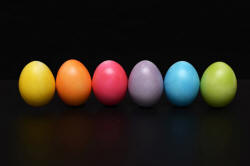 |
Six sorts of determiners |
In English, there are, essentially (this is an essential guide) six sorts of determiners and we will look at each in turn to see how they behave.
- Articles: a, an, the
and Ø
(the zero article)
For example:
She came on the bus
I need a new car
They lead an exciting life
I have Ø flu - Demonstratives: this, that, these, those
For example:
Take this money
Open that window
Let me show you these pictures
Do you want those cups? - Distributives: each, every, either, neither, both
For example:
Give every student a name tag
Each child gets the same report
Either car will be big enough
Neither restaurant is open
Both houses are too expensive - Interrogatives: what, which, whose
For example:
Which car is his?
What colours do you have?
Whose room is that? - Possessives: my, your, her, their etc.
For example:
That's my sister
Did they get their certificates?
The dog's hurt its leg - Quantifiers: some, many, four, all, both etc.
For example:
I have some time to spare
Has he got enough money?
They have three holidays a year
Here's a summary with a few more examples:
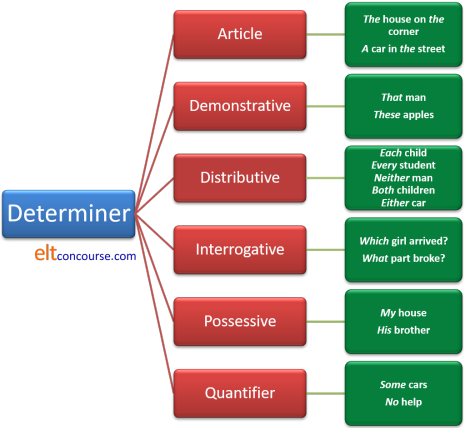
 |
Count vs. mass nouns |
It is not possible to understand or teach very much to do with determiners unless this distinction is clear. Linked at the end is the dedicated guide to the concepts of mass and count nouns so this is only a brief overview.
Whenever you use a noun in English, the language forces you to decide whether it is a count noun, such as dog, tree, garden, car or month or a mass noun such as sugar, water, furniture, information or anger. The differences are:
- Mass nouns do not take plural forms and do not work with
plural verbs so we do not allow:
*I have many furnitures
*Angers are bad emotions
Mass nouns can stand alone without a determiner so we can have:
Salt is bad for you, my doctor tells me - Count nouns exist in both the plural and the singular so we
can have, e.g.
There are too many tables in here
The answer was 15
The questions were really hard
Count nouns cannot stand alone without a determiner in the singular so we do not allow:
*Book is nice
A moment's thought will reveal that determiners work very differently depending on whether the noun they determine is a count noun or a mass noun. And, if it is a count noun, whether it is singular or plural.
 |
Mini-task: Can you say why the following six are wrong? Can you correct them? Click here when you have your answers. |
- Did they give you many help?
- Can you lend me a money?
- Have you got both information?
- There aren't much chairs here
- Pass those pencil
- Give me that books
Answers:
- Reason: the determiner many is only used with plural count
nouns.
Correction:
Did they give you much help? - Reason: the determiner a cannot be used with mass nouns.
Correction:
Can you lend me some money? - Reason: the determiner both can only refer to
two count
nouns.
Correction:
Have you got the information?
or
Have you got both pieces of information? - Reason: the determiner much is only used with mass nouns.
Correction:
There aren't many chairs here - Reason: the determiner those can only be used with plural
count nouns.
Correction:
Pass that pencil
or
Pass those pencils - Reason: the determiner that can only be used with singular
count nouns or mass nouns.
Correction:
Give me those books
or
Give me that book
or
Give me that paper
 |
Choosing the right determiners |
This is an essential guide so we are only dealing with a limited
range of the most common determiners. Much more detail is
available in the in-service guides to the area.
As we saw above, the choice of determiner depends on the nature of the
noun. There are three to consider:
- mass nouns
such as furniture, information, sugar - singular count
nouns
such as house, garden, knife - plural count nouns
such as books, children, mice
On the whole, determiners are mutually exclusive. That
means that we do not usually use two determiners to refer to the
same noun so, for example:
*The some men were here
*That the house is very nice
*My the money is here
*Some the pencils are broken
are all disallowed in English.
Other languages may allow these kinds of structures.
- Articles
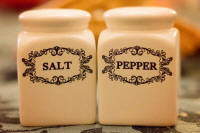
-
The main function of articles in English is to indicate what is
known to the speaker and hearer or writer and reader about the
noun in question. In other words, they act to specify a
noun or leave it unspecified. There is a difference,
therefore, between:
Ø Pepper used to be a very expensive spice
Ø Peppers are grown in India
A pepper plant has died
in which the reference is to all pepper and pepper plants or to an unspecified plant. We know what sort of thing is being referred to but not exactly which.
And, on the other hand:
The pepper is in the right-hand cupboard
The pepper plant has died
refer to particular specified instances of the noun. We know what sort of thing this is and, in addition, which it is.- The definite can be used with mass nouns and
with plural count nouns:
Pass the salt
We missed the train
They stayed in the cottages by the sea - The indefinite article can only be used with singular count
nouns:
Lend me a pen
I planted an ash tree - The zero article (which looks like no article) occurs with mass and plural count
nouns:
Ø Cars are expensive items
Ø Dust gets everywhere
- The definite can be used with mass nouns and
with plural count nouns:
- Demonstratives
-

- Demonstratives perform a pointing function. They indicate
where something is in relation to the speaker / writer and they
also indicate what kind of noun is being mentioned (singular,
mass and plural).
The demonstratives these and this indicate that the item is near to the speaker and that and those indicate that it is further away. English cannot, as some languages can, indicate whether it is far from the hearer as well.- The demonstratives this and that can only be used with mass
nouns or with singular count nouns:
I really like this furniture
That advice was unhelpful
She broke that glass
This house is too small - The demonstratives these and those can only be used with plural
count nouns:
They lived in those apartments near the sea
Can you repair these pieces of jewellery?
- The demonstratives this and that can only be used with mass
nouns or with singular count nouns:
- Distributives
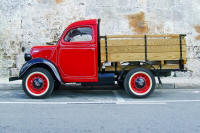
- As the name implies, these determiners function to
distribute nouns and they can be inclusive or exclusive.
- each
is inclusive and treats the nouns as separate (and singular) so we have, e.g.:
Give each child a pen
Each of you must decide alone
When this determiner is combined with of it determines only a plural count noun. - every
treats the nouns inclusively but as a group rather than as individuals (hence its combination with -one, -thing, -body) so we have, e.g.:
Every part of the house was searched
Tell every customer the same thing
There are two issues with this word:- it must refer to more than two items or people so we
allow:
I broke every glass in the house
but not:
*He held a glass in every hand - it cannot occur with an of-expression so we
do not allow:
*Every of the children came
- it must refer to more than two items or people so we
allow:
- both
only refers to two entities and is inclusive so it occurs with a plural verb and pronoun forms as in, e.g.:
Both parents came to the party with their children - either
also refers to two entities only but is inclusive so it means that only one of the alternatives is not allowed. We can have therefore:
Either hotel will suit us
which means we can select a hotel but both the possibilities are included.
When either is paired with or, the meaning is exclusive. - neither
is exclusive and signals that both alternatives are disallowed so, e.g.:
Neither hotel suits us
means that a third alternative must be found.
- each
- Possessives

- The main function of these determiners is to indicate
ownership but they can indicate other relationships including
origin and description as in, e.g.:
Her imprisonment was unjust
His reaction startled me
Your complaint has been rejected
My government is unpopular
His letter was a nice surprise- Possessive determiners can be used with any noun type,
mass, singular or plural:
My house is the one with the blue door
Her dogs are vicious
Their assistance is welcome
Your correspondence was ignored
His response was immediate
I think its batteries are dead
That is different from our information - In English, unlike many languages, possessive
determiners do not co-occur with most other determiners such
as articles demonstratives and interrogatives so we cannot
have, for example:
*Their the house is on the corner
*Which your book did she borrow
*That their house is beautiful - They can co-occur with a
very limited range of quantifiers so we allow, for example:
Half my garden is untidy
All our effort has been wasted
but we do not allows
*Many my friends are here
*A lot their money was lost - One possessive determiner, his, can also act as a pronoun but the others change their form when they are used in that way, with my changing to mine, her to hers, your to yours, our to ours and their to theirs. The possessive determiner its has no pronoun form at all.
- Possessive determiners can be used with any noun type,
mass, singular or plural:
- Interrogatives
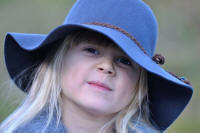
- As the name suggests, these determiners occur in question
forms and signal the subject of the question.
The determiner whose refers to possession (or other characteristics (see above)), which implies a limited choice and what implies a more open-ended selection. So, for example:
What train did he take?
suggests that the questioner has no idea at all and there is an almost unlimited range of possible responses but:
Which train did he take
suggests that the questioner has a limited number of options in mind.- These are usually referred to as wh-words.
The three in question are which, what and whose
and they can all be used with any noun type, mass, singular or plural:
Which house did she buy?
What beer do they sell here?
Whose coats are those? - These also occur in reported questions:
They asked me which house she bought
He wanted to know what beer they sold there
Mary asked whose coats they were
- These are usually referred to as wh-words.
The three in question are which, what and whose
and they can all be used with any noun type, mass, singular or plural:
- Quantifiers
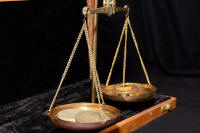
- Quantifiers are the most complex class of determiners and,
as their name implies, they signal quantity. Sometimes,
they are quite precise, such as two, both, neither
etc., sometimes imprecise such as several, a few, a little
etc. and sometimes very vague such as some, lots, much
etc.
- many, a few, few and several only occur with
plural count nouns:
I don't have many friends
She has a few minutes to spare
There are few good reasons
She has several good ideas - much, a little, a bit of and little only occur with mass
nouns:
They don't have much time
We have a little milk
There is little help I can give
Have a bit of cake - all, enough, lots of, more, most, plenty of, some
and any only occur with plural count nouns and
mass nouns:
They took all the furniture
She lost all her cases
We have enough work
I don't have enough potatoes
They have lots of experience
We have lots of trees in the garden
More cake?
Bring some more chairs
Most people like her
He broke most tools he used
They have plenty of help
There are plenty of reasons to come
Do you want some biscuits?
Would you like some tea?
Do you have any ideas?
Is there any water in that bowl?
- many, a few, few and several only occur with
plural count nouns:
Quantifiers are the area of greatest concern to learners because English
is quite specific about which quantifiers can be used with what
sorts of nouns.
The following is quite brief and incomplete so if you want to know
more, go to the in-service guide to this area where this table is
extended.
| Item | Singular | Plural | Mass | Notes |
| Plural count and mass nouns only | ||||
| enough |
|
|
|
|
| more |
|
|
|
|
| most |
|
|
|
|
| some |
|
|
|
|
| all |
|
|
|
This is also a pre-determiner |
| a lot of / lots of |
|
|
|
This is informal |
| Singular count nouns only | ||||
| either |
|
|
|
Only for a choice of two things |
| neither |
|
|
|
|
| each |
|
|
|
These are called distributives |
| every |
|
|
|
|
| one |
|
|
|
|
| Only plural count nouns | ||||
| both |
|
|
|
Only for two items |
| many |
|
|
|
Compare much |
| a few / few |
|
|
|
a few means enough, few means not enough |
| several |
|
|
|
Between 3 and 7 |
| two (+) |
|
|
|
|
| Only mass nouns | ||||
| a little / little |
|
|
|
a little means enough, little means not enough |
| much |
|
|
|
Compare many |
| No restrictions | ||||
| any |
|
|
|
Usually only in negative and question clauses |
| no |
|
|
|
Usually only in statements and questions |
Here's a summary of determiners (but it is not the whole
picture):
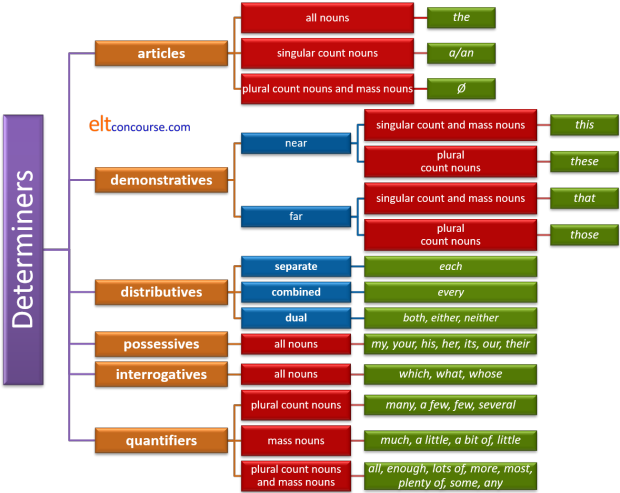
Try a simple test on these categories.
 |
Questions and negatives |
Most determiners are uncomplicated in that they can be used in positive, negative and interrogative sentences. Some are less obliging, however. Compare, for example:
- She has some time to spare
- She doesn't have any time to spare
and it is clear that we use some in positive sentences
and any in negative ones. As far as it goes, the rule
works. It also applies to words in the same some- and
any-sets so we get, e.g.:
I have something to show you
There is somebody at the door
I haven't got anything to say
There isn't anybody free to help
etc. although in this case the words are pronouns, not determiners.
However, we can also allow:
- Would you like some help?
- Can you give me some help?
- Do you have any aspirins?
- Do you want any more money?
The usual rule that is given to students is that we use any
in questions and some only in positive sentences but we can
see that this is not working here.
The answer is to look at the function of the sentence, not its form.
Sentences 3. and 4. are not really questions: Sentence 3. is an
offer and Sentence 4. is a request. In both cases, therefore,
we can use some instead of any.
Sentences 5. and 6. are both real questions so we use any.
We can also compare:
- She admitted stealing some food
- She denied stealing any money
- I often have some time on my hands at the weekend
- I rarely have any guests to dinner
and it appears that Sentences 8 and 10 are breaking the rule. However, again, we need to look at the function of the sentences, not their form. Both Sentences 8. and 10. are negative in meaning if not in form because of the verb deny and the adverb rarely.
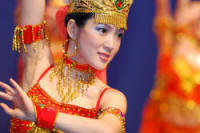 |
A question of style |
The determiners much, many and a lot (of) have
similar issues. Neither much nor many are
naturally used in positive sentences so it is possible to
find:
I have much
to do
and
She has many
friends
the usual choice will be something like:
I have a lot
to do
and
She has a lot
of friends
Questions, too, can be formed with much and many
but they are again, slightly unnatural and formal:
Do you have
much to do?
Does she have many
friends?
and a lot (of) would probably be a more natural choice in
informal language in
both cases but in more formal speaking and writing, much
and many are the determiners of choice.
Negative sentences, however, are a different matter and in these
we get the quite natural:
I don't have
much to do
She hasn't got many
friends
although a lot (of) is still a possible alternative.
| Related guides | |
| word class map | this link takes you to the index of guides to word classes on this site |
| count and mass | for the guide to mass and count nouns |
| article use in English | this is a short PDF document setting out the main rules and some exceptions |
| demonstratives: essential guide | this covers the main uses of demonstrative determiners in English |
| determiners | for a more advanced guide in the in-service section of the site with links to other types of determiners |
